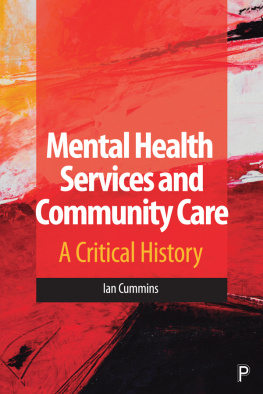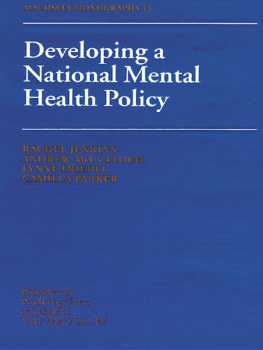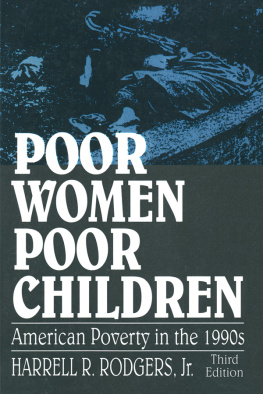Whats Wrong with the Poor?
STUDIES IN SOCIAL MEDICINE
Allan M. Brandt, Larry R. Churchill, and Jonathan Oberlander, editors
Research for this book was supported by the Polonsky Academy for Advanced Study in the Humanities and Social Sciences at the Van Leer Jerusalem Institute.
2013 The University of North Carolina Press
All rights reserved
Manufactured in the United States of America
Designed and set in Arno Pro by Rebecca Evans
The paper in this book meets the guidelines for permanence and durability of the Committee on Production Guidelines for Book Longevity of the Council on Library Resources.
The University of North Carolina Press has been a member of the Green Press Initiative since 2003.
Library of Congress Cataloging-in-Publication Data
Raz, Mical.
Whats wrong with the poor? : psychiatry, race, and the
war on poverty / Mical Raz.
p. ; cm.(Studies in social medicine)
Includes bibliographical references and index.
ISBN 978-1-4696-0887-7 (hardback)
1. United StatesSocial policy. 2. PoorGovernment policyUnited States. 3. PoorUnited States. 4. Poverty Psychological aspectsUnited States. 5. Deprivation (Psychology) I. Title. II. Series: Studies in social medicine.
[DNLM: 1. PovertyhistoryUnited States. 2. Poverty
psychologyUnited States. 3. African Americans
historyUnited States. 4. Cultural DeprivationUnited
States. 5. History, 20th CenturyUnited States. 6. Public
PolicyhistoryUnited States. HC 79.P6]
HV95.R39 2013
362.50973dc23 2013015589
17 16 15 14 13 5 4 3 2 1
To the brave MEN and WOMEN
PATIENTS, STAFF, and VOLUNTEERS
at Physicians for Human Rights, Israel
Contents
CHAPTER ONE
A Mothers Touch?
CHAPTER TWO
Cultural Deprivation?
CHAPTER THREE
Targeting Deprivation
CHAPTER FOUR
Deprivation and Intellectual Disability
CHAPTER FIVE
Environmental Psychology and the Race Riots
Illustrations
University of Manitoba researcher John Zubek outside his sensory deprivation chamber, ca. 1966
Joseph McVicker Hunt plays with a baby, 1977
Siegfried Engelmann and a four-year-old student at the University of Illinois intervention program headed by Carl Bereiter
Classroom organization at the Institute for Developmental Studies
An indoor sandbox provides tactile stimulation at the Institute for Developmental Studies
Childrens names are displayed prominently at the Institute for Developmental Studies
Mealtime at Project Head Start
Lady Bird Johnson visits a Head Start classroom, 1968
President John F. Kennedy meets with Kammy and Sheila McGrath, National Retarded Childrens Week poster children for 1961
Meeting of the National Advisory Commission on Civil Disorders, 1967
Acknowledgments
It is a great pleasure to acknowledge the many people who have supported me throughout this project. I began this research while a Polonsky Postdoctoral Fellow at the Van Leer Jerusalem Institute in 2009. I am grateful to Gabriel Motzkin and the administrative staff who supported my work and my archival research. As a historian of American psychiatry working in Israel, I had the good fortune to benefit from a small but strong community. Otniel Dror suggested the topic of sensory deprivation; conversations with Eduardo Duniec, Noah Efron, and Michael Zakim helped shape my early ideas. My longtime mentor, Jos Brunner, has always encouraged me to pay attention to the politics of mental health. Rona Cohen offered wise insights and unwavering support.
At Yale University, I was incredibly lucky to join the vibrant history of medicine community. My primary debt is to my postdoctoral mentor, Naomi Rogers, who gave generously of her time and wisdom and guided me through the different stages of writing and editing this book. While encouraging me to find a more narrative tone, Naomi helped me ground my ideas in American history. Equally important, Naomi provided a role model for being a politically engaged historian, a feminist, and a dedicated educator. I am also grateful to John Warner, who welcomed me to the department and supported my work and professional development. Participants at the Holmes Workshop offered valuable feedback on my work. I am particularly grateful to Ziv Eisenberg, Kate Irving, Rodion Kosovsky, Marco Ramos, Sally Romano, and Courtney Thompson from the Yale History of Psychiatry Working Group and the Program in the History of Science and Medicine. Debbie Doroshow, who read and commented on early versions of this book, has been a longtime supporter and wise colleague. Matthew Gambino served as an invaluable sounding board in discussing the intersections of race, psychiatry, and poverty. Ewa Lech and Ramona Moore provided me with endless technical and administrative support, useful advice, and kindness.
Historians of American medicine provided a valuable community within which to develop my ideas and arguments. I am particularly grateful to Andrea Tone for her continued support and friendship. Conversations with Jonathan Metzl provided inspiration in analyzing the race riots. Gerald Oppenheimer, David Rosner, and the other participants in the Rosner Lecture Series at the Columbia University Department of Sociomedical Sciences, where I presented an early version of chapter 3, provided thoughtful comments, drawing my attention not only to what I was saying but to what was being heard.
In the course of my research, I was fortunate to have the assistance of knowledgeable and accommodating archivists. I am particularly grateful to Lizette Royer Barton and Dorothy Gruich at the University of Akron Center for the History of Psychology; Diane Richardson at the Oskar Diethelm Library, Cornell University; Shelley Sweeney at the University of Manitoba; Gary McMillan at the American Psychiatry Association; Bryan Whitledge at the University of Illinois at Urbana-Champaign; and Stephen Greenberg at the National Institutes of Health. The Hamilton Grant from the University of Manitoba and the J. R. Kantor Award from the Center for the History of Psychology at the University of Akron helped fund research travel from Israel.
At the University of North Carolina Press, I had the good fortune to work with Joe Parsons, who enthusiastically pushed this project forward. Having such a skilled, accessible, and kind editor made the publishing process seem simple. Barbara Beatty and Gerald Grob, who reviewed the book manuscript, offered astute insights.
Friends and family have provided love, support, and dog-sitting assistance over the years and across continents. Noga and Neri Minsky welcomed me to their home during my numerous research trips to the East Coast. Mentors and colleagues at the Internal Medicine J Department at the Tel Aviv Medical Center have been patient, kind, and often awe-inspiring.
My biggest debt is to my parents. While my father, Tzvi, died two years before I began this project, there is much of him evident throughout the book. He loved history, was strongly committed to justice, and cherished the rather romantic notion that education could combat poverty. I am grateful for his insistence that I study medicine, which he thought would at the very least keep me out of trouble. All of my childhood memories of my mother, Orna, involve books and letters, yet she always prioritized community action and social solidarity over formal education. She and her partner, Johnny, have provided love and encouragement throughout this project. Finally, I am grateful to Sophie, whose infinite furry wisdom helped me never lose sight of the truly important things in life.
Whats Wrong with the Poor?
Introduction
At a white house afternoon tea in February 1965, Lady Bird Johnson announced the establishment of Project Head Start, an early childhood educational program that would serve childrenmany of them African Americanfrom low-income homes. Designed and administered by the Office of Economic Opportunity, this new program drew much media attention. Moved by the educational opportunities these children would be afforded but distressed at their meager backgrounds, the First Lady described how some of these children had never seen a flower, had never sat in a chair; some did not even know their own names.
Next page









